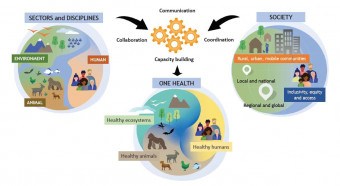In the early 2000s, as the relationships between biodiversity, ecosystem services and health become clear, calls arose for international alliances to fill the gaps between the environmental sector and the health and development communities, and for local and national governments to start implementing programmes to address the links between human well-being and biodiversity as a matter of urgency. New approaches and initiatives arose to help scientists and policy makers to work more closely within and across disciplines to ensure that the linkages between biodiversity, ecosystems and health could be better understood and factored into decision making. These included ecosystem approaches to health (often called ecohealth), One Health, green health, and others - all of which are built around similar principles, e.g. identifying critical ecosystems and ecosystem processes, identifying wildlife and human communities at risk, and assessing the social, cultural and economic dimensions of biodiversity-health interlinkages.
The One Health approach gained prominence around 2005, becoming particularly important as a framework for cross-sector collaboration, and has been referenced in several multi-lateral processes and agreements on health, climate and biodiversity. The concept originated through scientific partnerships between nature conservation organisations, veterinary scientists, and public health experts. From the outset, it had a strong focus on biodiversity due to the increasing evidence of the importance of preserving ecological integrity as a means of reducing disease risk in humans, wildlife and livestock.
However, in practice, One Health soon became seen primarily as an issue for veterinary medicine, and for a number of years this is where the majority of resources for research and community intervention were devoted. Other key aspects of One Health, including mental and physical well-being, disaster risk reduction and nutrition, received less attention, and the focus on biodiversity also diminished. Before the emergence of Covid-19, many scientists and policy makers were calling for a more biodiversity-inclusive One Health approach. Indeed, other key environmental drivers of health outcomes - such as air, soil and water quality - were also somewhat absent from One Health efforts..
Recognising the need for a co-ordinated and standardised approach to One Health, four intergovernmental organisations - the Food and Agriculture Organisation, the World Health Organisation, the UN Environment Programme, and the World Organisation for Animal Health - have come together to establish the Quadripartite Alliance for One Health. The Quadripartite defines One Health as “an integrated, unifying approach that aims to sustainably balance and optimise the health of people, animals and ecosystems.” It asserts that “the health of humans, domestic and wild animals, plants and the wider environment (including ecosystems) are closely linked and interdependent.”
The One Health approach recognises that many of the drivers of biodiversity loss are also drivers of health risks and health outcomes. These shared drivers include demographic change, pollution, ecosystem degradation, climate change and unsustainable exploitation of nature. The aim of the One Health approach is to facilitate co-ordination and co-operation across the wide range of sectors, disciplines and communities (social, political and scientific) in order to tackle threats to health and ecosystems, while addressing the collective need for clean water, energy and air, safe and nutritious food, taking action on climate change, and contributing to sustainable development.
The Quadripartite works to support and promote solutions to better manage threats to the health of humans, animals, plants, and the environment and prevent potential future pandemics. It is supported by a Secretariat which is housed within the World Health Organisation in Geneva, and is supported scientifically by a One Health High Level Expert Panel comprising experts in relevant disciplines from around the world. Some effort is still required to ensure that the role of ecosystems as the settings within which human health is determined is appropriately considered, and issues such as nutrition security, traditional medicinal and ecological knowledge, and mental well-being still receive less focus than infectious diseases from animals (zoonoses) and the threat of antimicrobial resistance.
At Cohab, we work with members of the Quadripartite and other intergovernmental bodies to promote a robust One Health approach and to support its implementation at global, national and local levels. Cohab also brings an additional focus on partnership and bridge-building to One Health and related approaches, linking the knowledge and experience of communities with scientific evidence to inform the development and implementation of effective policy and practical responses.


